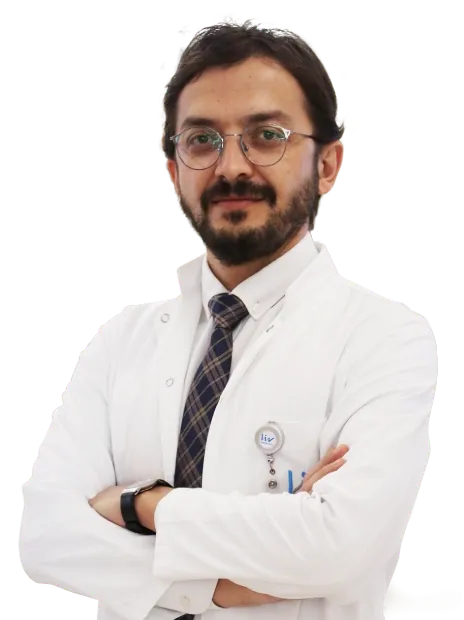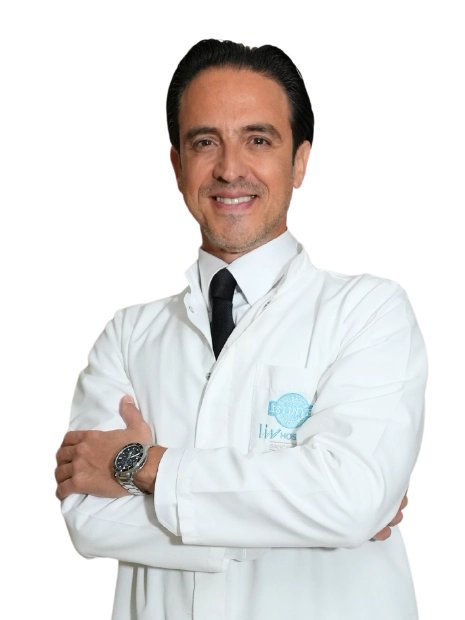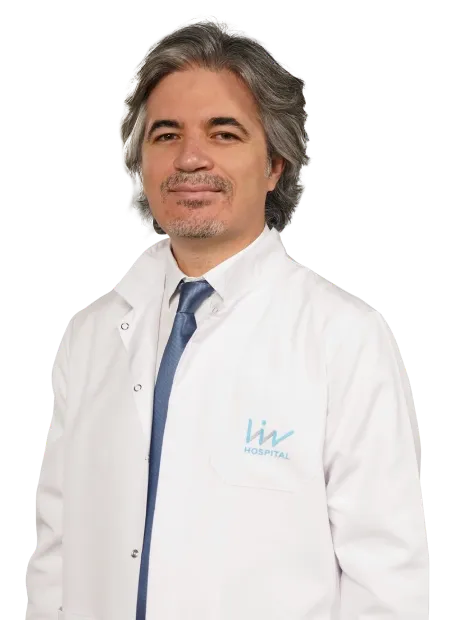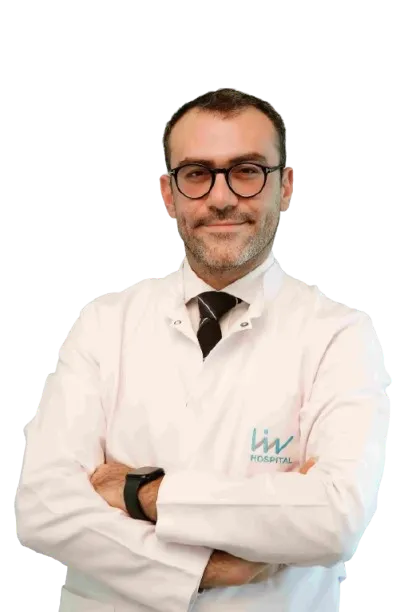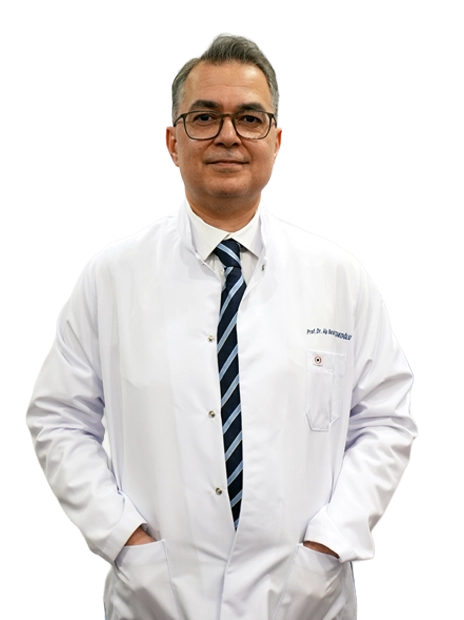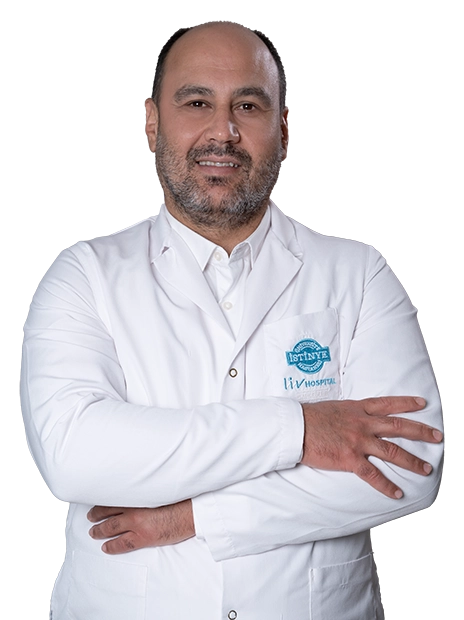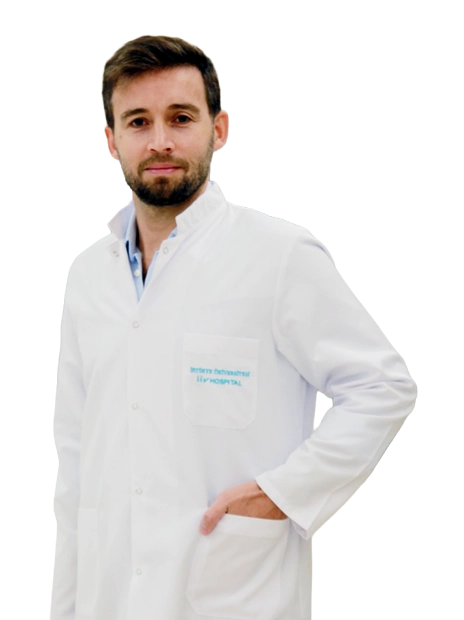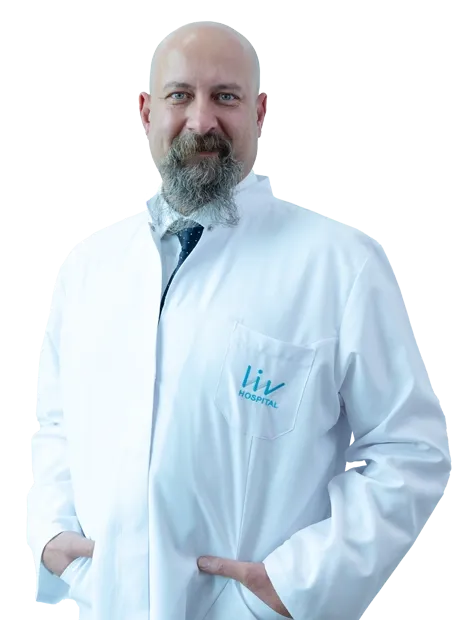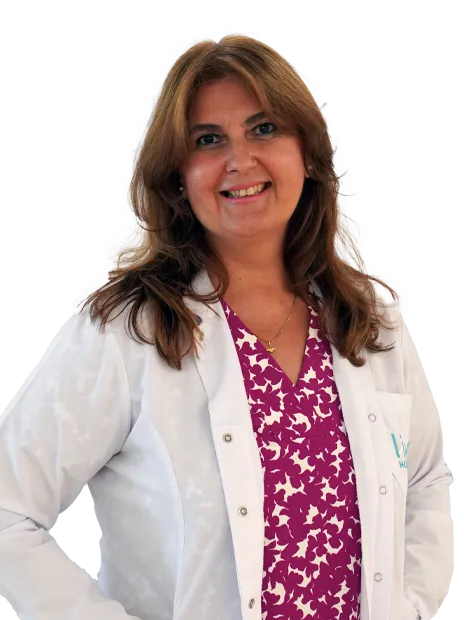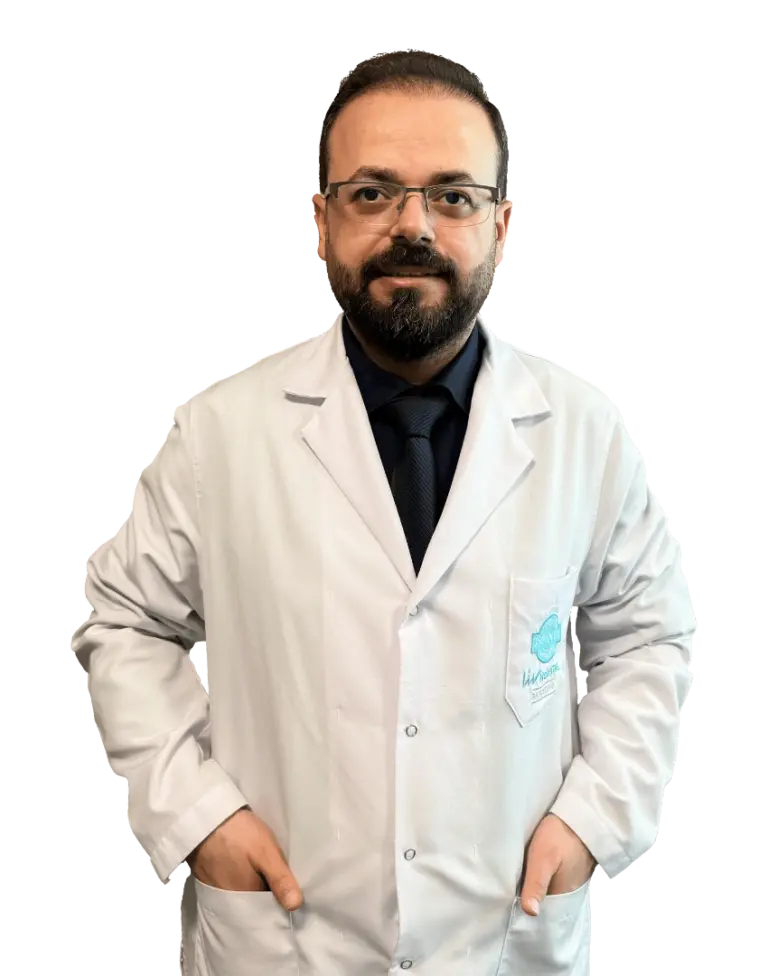Learn from an amazing example of dr talks to patients with prostate cancer effective communication. Powerful advice for all caregivers.
When a child is diagnosed with cancer, families often wonder who will care for them. At Liv Hospital, we get how scary a cancer diagnosis can be. Our team of pediatric oncologists and support staff are here to give top-notch care to kids with cancer.

Pediatric oncologists are doctors who have learned a lot to treat childhood cancers. They know how childhood cancers are different from adult cancers. This lets them give treatments that really work for kids.
Our team of pediatric oncology experts works together to give complete care. We aim to get the best results for our young patients and their families.
Key Takeaways
- Pediatric oncologists are specialized doctors who treat children with cancer.
- Childhood cancer treatment requires a complete and team effort.
- Our team at Liv Hospital is dedicated to providing world-class care for children with cancer.
- Pediatric oncologists have undergone extensive training to diagnose and treat childhood cancers.
- Understanding the differences between adult and childhood cancers is key for effective treatment.
The Specialized Field of Pediatric Oncology
Pediatric oncology deals with cancers in children. It’s a unique field that tackles the special challenges of childhood cancers. These cancers are different from adult cancers in many ways.
Childhood cancers are rare and have their own biology. This means they need a special treatment approach. Pediatric oncology has evolved to meet these unique challenges, aiming to improve survival and quality of life for young patients.
What Makes Childhood Cancers Different
Childhood cancers are different from adult cancers in several ways:
- Cancer types: Children often get cancers like leukemia, brain tumors, and neuroblastoma.
- Cancer progression: Childhood cancers grow faster than adult cancers.
- Response to treatment: Children’s bodies react differently to treatments, needing custom plans.
It’s important to understand these differences for effective treatment. Our team keeps up with the latest in pediatric oncology to give the best care.
The Evolution of Pediatric Cancer Treatment
Pediatric oncology has seen big changes over time. Treatments have gotten better, with:
- Multidisciplinary care teams
- Targeted therapies
- Advanced surgical techniques
These improvements have led to better survival rates and outcomes for kids with cancer. Our commitment is to continue providing cutting-edge care that meets each child’s unique needs.
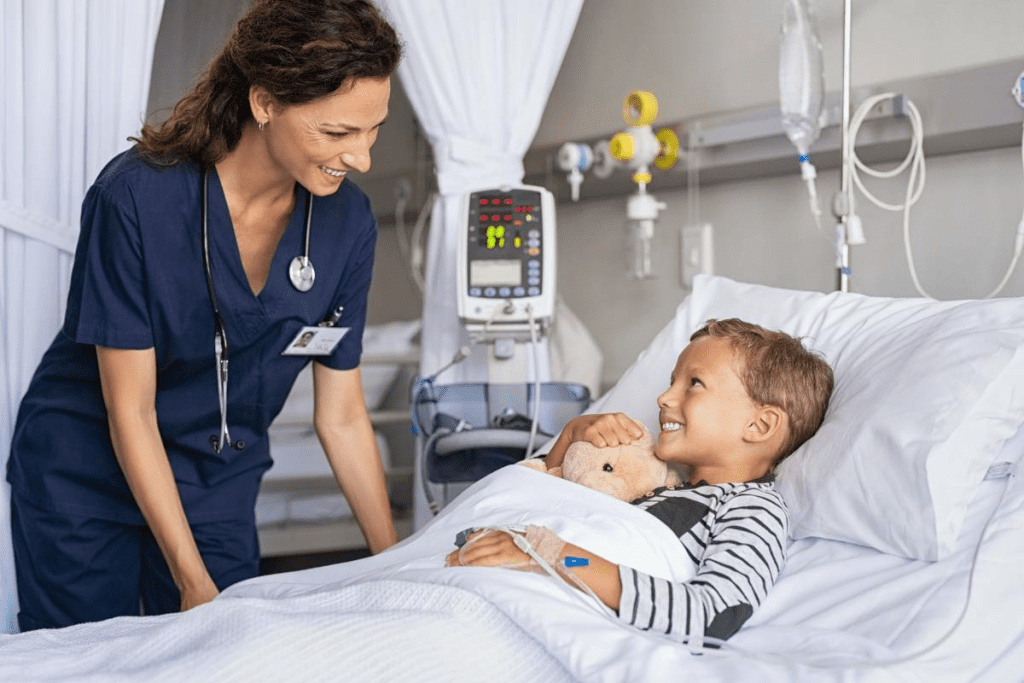
We keep pushing forward in pediatric oncology, aiming to improve treatment and the lives of children with cancer. Through research and teamwork, we work towards the best outcomes for our young patients.
What Do Pediatric Oncologists Do?
Pediatric oncologists do many things, like diagnosing, treating, and caring for kids with cancer. They know how tough it can be for kids and their families during this time.
Diagnostic Responsibilities
Pediatric oncologists find out what kind of cancer a child has. They use tests like imaging and lab work. They also work with other doctors to make sure they get it right.
Finding out what kind of cancer a child has is key. It helps them plan the best treatment. They use special tests to learn about the cancer, so they can treat each child differently.
Treatment Planning and Management
After finding out what’s wrong, they make a treatment plan. This might include chemo, radiation, or surgery. They work with other doctors to make sure the plan is just right for each child.
They think about more than just the cancer. They want to make sure the child stays healthy and happy. They try to keep side effects down and support the child every step of the way.
Long-term Patient Monitoring
Even after treatment, pediatric oncologists keep an eye on their patients. They check for any signs of cancer coming back. They also watch for any lasting effects of treatment.
Keeping an eye on kids long-term is very important. It helps them stay healthy as they grow up. The team is always there to support them and their families, no matter what.

Education and Training of Pediatric Cancer Doctors
Becoming a pediatric oncologist takes a lot of education and training. Our team of pediatric oncologists is highly qualified. They have gone through a lot of education and training to give the best care to children with cancer.
Medical School and Residency Requirements
To become a pediatric oncologist, one must first complete medical school. This is where they learn the basics of medicine and patient care. Then, they need to do a residency in pediatrics, which lasts three years.
This residency gives them hands-on experience in caring for children. They work under experienced doctors to learn how to diagnose and treat childhood illnesses, including cancers. This is key for building a strong foundation in pediatric care.
Fellowship Training in Pediatric Oncology
After residency, aspiring pediatric oncologists must do fellowship training in pediatric oncology. This training can last several years. It focuses on the diagnosis, treatment, and management of childhood cancers.
Fellows work with experienced pediatric oncologists. They learn about the latest treatment protocols and research. This training is essential for staying up-to-date with pediatric cancer treatment.
Ongoing Education and Certification
Ongoing education is important for pediatric oncologists. They must stay updated with the latest in cancer treatment and research. We encourage our doctors to keep learning through conferences, workshops, and seminars.
They also need to keep their certification current. This means they must continue their education and meet high standards of practice. By doing this, our pediatric oncologists stay at the top of pediatric cancer care. They ensure our patients get the best treatment possible.
Common Childhood Cancers and Their Treatment
It’s important to know about the common childhood cancers. They are different from adult cancers. Children need special care that meets their unique needs.
Leukemia: The Most Common Childhood Cancer
Leukemia is the most common childhood cancer. We help families create treatment plans for each child. Treatment often includes chemotherapy, and sometimes a bone marrow transplant is needed.
Brain and Spinal Cord Tumors
Brain and spinal cord tumors are also common in kids. These tumors can be either benign or malignant. Our team has experts in pediatric neurosurgery and oncology for these complex cases.
Treatment may include surgery, radiation, or chemotherapy. It depends on the tumor’s type.
Lymphomas and Solid Tumors
Lymphomas, like Hodgkin lymphoma, and solid tumors, such as neuroblastoma and Wilms tumor, are significant. Our approach is to have a team of specialists work together. They create treatment plans that fit each child’s needs.
Childhood cancer treatment is always getting better. We work with families and other healthcare professionals. Our goal is to give the best care to children with cancer.
The Complete Care Team Beyond Oncologists
When treating childhood cancer, a full care team is key for the best results. We think a complete care team is vital for kids with cancer. Our team covers all treatment and support needs.
Our care team has many healthcare experts working together. Led by pediatric oncologists, it also includes other important members. They all help make the patient’s care plan complete.
Pediatric Oncology Nurses
Pediatric oncology nurses are trained to care for kids with cancer. They are key in giving treatments, watching patient health, and supporting patients and families. These nurses make sure our young patients get the best care.
Their jobs include:
- Administering chemotherapy and other treatments
- Monitoring patient health and reporting any concerns
- Providing education and support to patients and families
- Coordinating care with other healthcare professionals
Surgical Specialists
Surgical specialists are also vital in our care team. They do surgeries needed for diagnosis, treatment, or symptom management. Their skills ensure our patients get the right surgical care.
Radiation Oncologists
Radiation oncologists focus on using radiation therapy to treat cancer. They work with the team to plan treatments that include radiation. Their role is critical for our patients’ complete care.
Child Life Specialists and Support Staff
Child life specialists and support staff are also key. They offer emotional and psychological support to kids and families. Their work is essential for our patients’ well-being.
The complete care team works together for kids with cancer. By working well together, we support our patients’ physical, emotional, and psychological needs.
Treatment Protocols and Academic Standards
In pediatric oncology, we follow international standards and cutting-edge treatment protocols. This ensures the best outcomes for our young patients. Our approach is grounded in the latest research and a commitment to delivering care that meets the highest academic standards.
Evidence-Based Treatment Guidelines
We develop and implement treatment protocols based on evidence-based guidelines. These guidelines are formulated from extensive research and data analysis. This ensures that our patients receive the most effective care available. By adhering to these protocols, we can significantly improve treatment outcomes.
For instance, our institution, like Liv Hospital, integrates the latest evidence-based practices into our daily operations. This means that our patients benefit from the most current understanding of pediatric oncology. We translate this into actionable treatment plans.
Clinical Trials and Research Participation
Participation in clinical trials is a critical component of our treatment protocols. These trials allow us to evaluate new treatments and therapies. This provides our patients with access to innovative care that may not be available elsewhere. Our active involvement in research ensures that we stay at the forefront of pediatric oncology.
- Evaluating new chemotherapy agents
- Assessing the efficacy of targeted therapies
- Improving radiation therapy techniques
As noted by a leading oncologist, “Clinical trials are essential for advancing the field of pediatric oncology and improving survival rates.” This highlights our commitment to research and its role in improving patient care.
“The future of pediatric oncology lies in our ability to collaborate and share knowledge globally.”
A leading figure in pediatric oncology research
International Collaboration in Pediatric Oncology
We believe in the power of international collaboration to drive progress in pediatric oncology. By working together with other leading institutions and research networks, we can pool our knowledge and resources. This helps us tackle the challenges of childhood cancers more effectively.
This collaborative approach enables us to stay updated on the latest treatment protocols and research findings. This ensures that our patients receive care that is informed by global best practices.
How Doctor Talks to Patients with Prostate Cancer: Effective Communication Lessons Applied to Pediatric Oncology
The field of pediatric oncology can learn a lot from experts’ approaches to talking to patients with prostate cancer. The way aDr talks to patients with prostate cancereffective communication grounded in empathy, clarity, and honesty offers valuable lessons for pediatric oncology. where the challenges are high and the patients are young.
Age-Appropriate Communication Strategies
We know how important it is to adjust our communication to fit the age and developmental stage of our young patients. This means using clear and simple language that kids can understand, and being careful with their feelings.
- Using age-appropriate visual aids to explain medical concepts
- Encouraging questions and providing honest answers
- Involving children in decision-making processes when appropriate
Supporting Families Through Difficult Conversations
Helping families through the cancer journey means having difficult conversations with kindness and understanding. We aim to offer emotional support and clear info to help families get through tough times.
- Preparing families for what to expect during treatment
- Listening to their concerns and addressing them promptly
- Providing resources for additional support when needed
Building Trust Between Medical Teams and Young Patients
Building trust is at the heart of the care we give. By being consistent, reliable, and open in our talks, we build a strong bond with our young patients.
Clear and honest talk is key to trust between the cancer care team and families. We make sure to do this every day, so our young patients and their families feel supported and informed on their cancer journey.
Finding the Right Cancer Care for Your Child
Choosing the right cancer care for your child is a big decision. When your child is diagnosed with cancer, you face a tough healthcare landscape. You need to find a pediatric cancer center that fits your child’s needs.
Evaluating Pediatric Cancer Centers
When looking at pediatric cancer centers, several important factors matter. The expertise of the medical team is key. Look for centers with a team that knows how to treat childhood cancers.
It’s also important to check if the center offers comprehensive support services. These include psychological support, nutritional guidance, and child life specialists. These services are vital for your child’s well-being.
Another key factor is the center’s track record in treating childhood cancers. Ask about their survival rates and treatment protocols. Centers involved in research may offer the newest treatments.
Questions to Ask Possible Providers
It’s important to ask the right questions when choosing a provider. Here are some questions to consider:
- What experience does the medical team have in treating my child’s specific type of cancer?
- What treatment protocols are typically used, and are they evidence-based?
- Are there opportunities for participation in clinical trials?
- What support services are available for my child and our family?
- How will my child’s care be coordinated among different specialists?
Insurance and Financial Considerations
Understanding the financial side of your child’s cancer care is essential. Insurance coverage can vary a lot. It’s important to know what your policy covers. Many centers have financial advisors to help with these issues.
Also, think about any out-of-pocket costs and travel expenses if the center is far away. Some groups offer financial help to families with childhood cancer.
By carefully evaluating centers, asking the right questions, and understanding the financial side, families can make the best choice for their child’s care.
Childhood Cancer Statistics and Survival Rates
Recent data shows big improvements in survival rates for kids with cancer. Better treatments and care have led to these gains. We aim to keep families updated and supported through this journey.
Current Incidence Rates in the United States
Childhood cancer is a big worry, with about 11,000 new cases each year in the U.S. The top cancers in kids are leukemia, brain tumors, and lymphoma. We watch these numbers closely to find new ways to fight cancer.
Improvements in Treatment Outcomes
The 5-year survival rate for childhood cancer is now nearly 80%. This big jump is thanks to:
- Better chemotherapy
- New radiation methods
- Advanced surgery
- More support care
These changes have brought new hope to kids and their families.
Long-term Survivorship and Follow-up Care
As more kids survive, caring for them long-term is key. We offer special care for survivors, including:
- Checking for late treatment effects
- Managing ongoing health issues
- Helping with emotional and mental health
Our team works hard to help survivors live well.
Conclusion: Advances and Hope in Pediatric Cancer Treatment
At Liv Hospital, we are dedicated to giving top-notch care to kids with cancer. We use the newest methods in treating pediatric cancer. This keeps us hopeful for the future of these young patients.
Even with tough challenges, there’s a bright spot for kids with cancer. Thanks to new discoveries in pediatric oncology, we’re making progress. We promise to support and care for our young patients and their families, bringing hope and healing.
We’re always working to be leaders in pediatric cancer research and treatment. This means our patients get the best care available. With new treatments and ongoing research, we’re sure the future for kids with cancer will get brighter.
FAQ
What is pediatric oncology?
Pediatric oncology is the study and treatment of cancers in kids. Our doctors specialize in caring for children with cancer. They have a lot of training to help kids with this serious illness.
What do pediatric oncologists do?
Pediatric oncologists find and treat cancers in kids. They make plans for each child’s treatment and check on how they’re doing. They also work with other doctors to give kids the best care.
What are the different types of childhood cancers?
Kids can get different kinds of cancer, like leukemia and brain tumors. Our team knows how to treat these cancers. We make plans that fit each child’s needs.
How are treatment plans developed for children with cancer?
A team of doctors and nurses makes treatment plans. They consider what’s best for each child. This team includes oncologists, surgeons, and more.
What is the role of a pediatric oncology nurse?
Nurses are key in caring for kids with cancer. They help with treatments and check on the kids’ health. They also support kids and their families.
How do you communicate with children and their families?
We talk to kids and families in a way they can understand. Our team is trained to explain things in simple terms. This helps everyone feel supported and informed.
What should I consider when evaluating pediatric cancer centers?
Look at the doctors’ skills and the support services offered. Also, check the center’s success in treating kids with cancer. It’s good to ask questions and get a second opinion.
What are the current survival rates for childhood cancers?
Thanks to better treatments, more kids are surviving cancer. We make sure kids get the care they need to stay healthy after treatment.
How do you stay updated with the latest advancements in pediatric oncology?
We follow the latest research and treatment guidelines. We join clinical trials and work with other researchers. This way, we can offer the best treatments to our patients.
References
- Ostrom, Q. T., et al. (2025). CBTRUS Statistical Report: Childhood and Adolescent Primary Brain and Other Central Nervous System Tumors Diagnosed in the United States in 2014“2018. Neuro-Oncology, 27(Suppl_1), i1“i68.https://pubmed.ncbi.nlm.nih.gov/40971774/
- National Cancer Institute. (2025). Childhood Brain and Other Nervous System Tumors Treatment (PDQ ®)“Patient Version.https://www.cancer.gov/types/brain/patient/child-central-nervous-system-treatment-pdq
- Cancer Research UK. (2024). Brain tumours in children.https://www.cancerresearchuk.org/about-cancer/childrens-cancer/brain-tumours




